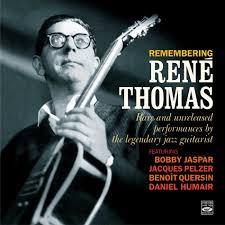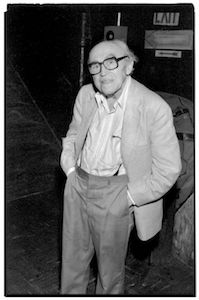
Daily Dose Of Jazz…
Benoît Quersin was born in Brussels, Belgium on July 24, 1927 into a family with a classical tradition. He met personalities like the composer Béla Bartókor and the pianist Stefan Askenaseat at a very young age. Shortly before the war, he discovered jazz secretly in his bedroom while listening to the records of Fats Waller and Louis Armstrong, then Belgian jazz bandleader Fud Candrix.
His beginnings as a musician were with the kids in his Brussels neighborhood. At the Liberation, Quersin set up his first orchestra. In 1947 he hired Jean Thielemans, who later became known as Toots, with whom he played for some time. He abandoned the piano for the double bass and obtained his first engagements. Toots took him to the Paris, France festival at a time when the headliners were Charlie Parker and Miles Davis.
Moving to Paris in 1950 he played and recorded with Sidney Bechet, Lionel Hampton, Sarah Vaughan, Dizzy Gillespie, Chet Baker, Lucky Thompson, Zoot Sims, Lee Konitz, Jimmy Gourley, Blossom Dearie, Mary Lou Williams, Kenny Clarke, and Jonah Jones among others. The French musicians were Stéphane Grappelli, Maurice Vander, Barney Wilen, Henri Renaud, René Urtreger, Sacha Distel, and Martial Solal, the Belgians were René Thomas, Bobby Jaspar, Francy Boland, Leo Mouse, Jacques Pelzer, and Jack Sels.
Returning to Belgium in 1957 he opened a jazz club in Brussels, the Blue Note, where people like Lou Bennett, Jackie McLean, Martial Solalor and Marc Moulin. In 1961, Quersin became host of jazz programs on Belgium radio RTB and interviewed Charles Mingus, Thelonious Monk, Ray Charles, Fats Domino and John Coltrane. Late in life he became an ethno-musicologist, passionate about world civilizations and the music of West and Central Africa, and collected traditional music from the Mbam ethnic group inCameroon. He would go on tomove to Zaire, Democratic Reublic of Congo and release several albums of traditional instruments.
Double bassist Benoît Quersin, who was an important double bassist on the international jazz scene during the 1950s and Sixties, died on May 31, 1992 in Vaison-la-Romaine, France.
More Posts: bass,ethnomusicology,history,instrumental,jazz,music

Daily Dose Of Jazz…
Max Gordon was born on March 12, 1903 in Svir, Russian Empire, now Belarus. His family emigrated to the United States in 1908 at age five and settled in Portland, Oregon, where he later attended Reed College. As a young man, he was interested in Russian and French novels and saw himself as a romantic type. Pursuing his parents’ wish that he become a lawyer, he moved to New York in 1926 to attend Columbia Law School, but began working in nightclubs and dropped out, choosing to get his education where he could find it.
In 1932 Gordon opened his first venue, Village Fair, in the tradition of Viennese coffee houses as a place for artists and writers. He relocated the venue once in 1934 and opened the Village Vanguard in 1935. The Vanguard initially offered poetry and was frequented by poets Maxwell Bodenheim and Harry Kemp. Over time, the club segued into cabaret acts, comedy, folk music and jazz before going exclusively jazz in 1957. That year Sonny Rollins was the first jazz musician to record in the venue.
The club subsequently hosted a who’s who of jazz greats from the 1940s to the 1980s including John Coltrane, Sidney Bechet, Dinah Washington, Albert Ayler, Miles Davis, Wynton Marsalis, Henry Threadgill and Thelonious Monk, who at the time an unknown, discovered by Gordon’s wife Lorraine. The club’s artistic direction was in part guided by Lorraine who had a keen interest in jazz. Over time the club became a popular recording spot and over 100 jazz albums have been recorded there.
Max sought new talent and gave younger performers a platform to showcase their work. In doing so he played a role in helping launch the careers of Judy Holliday, Betty Comden, Adolph Green, Barbra Streisand, Pearl Bailey, Woody Allen, Dick Gregory, Lenny Bruce, Irwin Corey, Woody Guthrie, and Lead Belly. He had a reputation for fairness and honesty among the performers.
In addition to the Vanguard, in 1943 Gordon opened the Blue Angel Supper Club in midtown Manhattan and was involved in its operation for fourteen years. He actively managed the Vanguard club well into his 80s. In 1982 he authored a memoir titled Live at the Village Vanguard which chronicles the history of the club.
Jazz promoter and founder of the Village Vanguard, Max Gordon, whose wife Lorraine continued the work and took an active role in managing the Vanguard club until her passing in 2018, transitioned at 86 on May 11, 1989.



